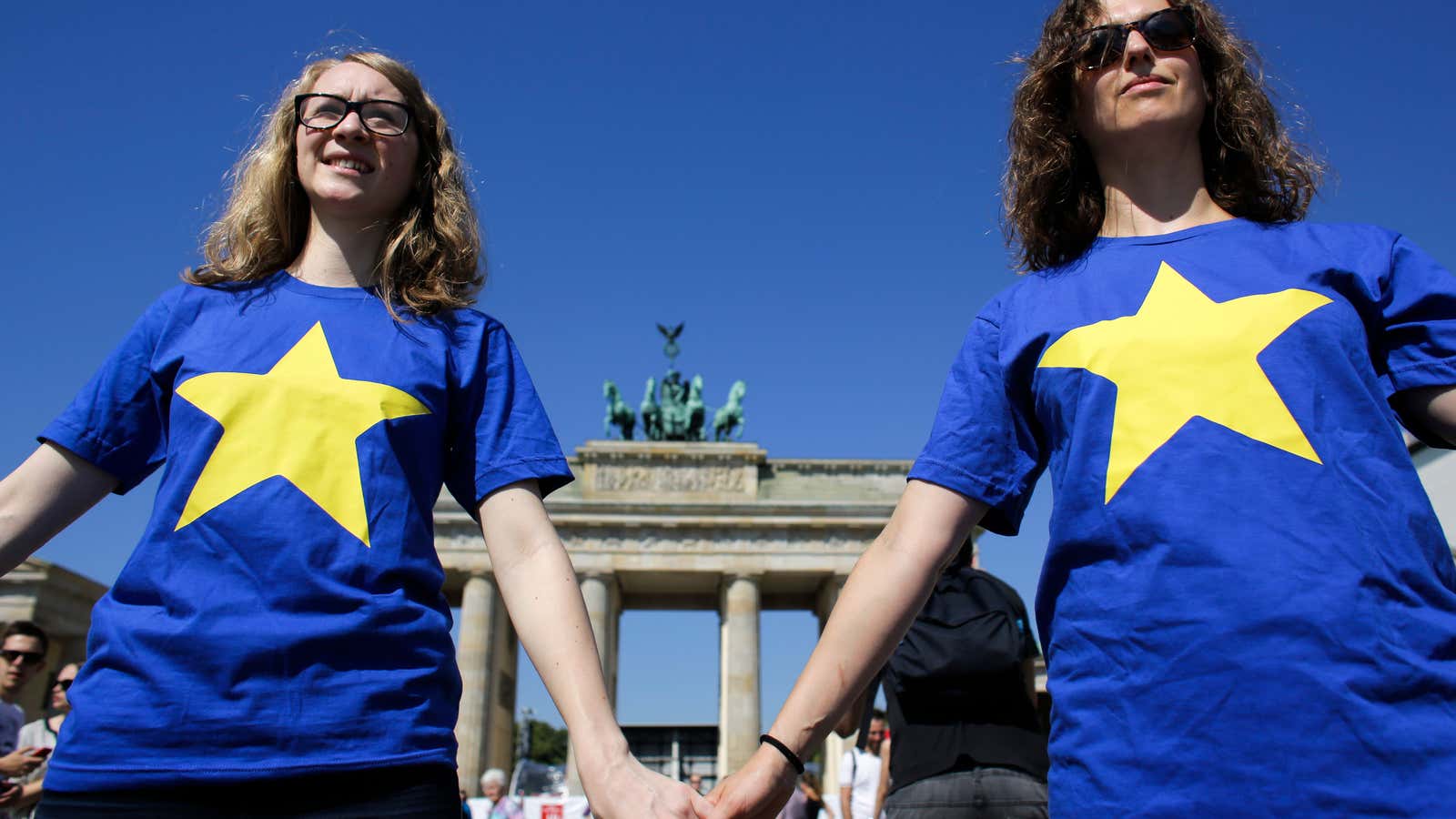The world is left stunned—and somewhat aghast—as Britain voted to leave the European Union.
Voters in the UK chose to leave by a margin of 52% to 48%. Now, with the world’s most complicated divorce finally set to begin, how have Britain’s rejected neighbors reacted to the results of this historic referendum?
President of the European Council, Donald Tusk, called upon people to remain calm. He described Britain’s decision to leave the EU as “a historic moment,” but insisted it was not the time for “hysterical reactions.” Tusk announced plans to meet the remaining 27 members of the EU to figure out how best to deal with Brexit. He added, “What doesn’t kill you makes you stronger.”
European Parliament president Martin Schulz is now waging a battle to avoid similar referendums taking hold across the rest of the EU. He said he was not shocked by the results, pointing out that “the United Kingdom since 40 years was wavering to be a fully fledged member or not. Now we have clarity for the United Kingdom to go on their own way.” Schulz insisted there will be “no chain reaction” after Brexit.
Here’s how member states of the EU reacted.
Germany
The reaction of Germany’s vice chancellor and economics minister, Sigmar Gabriel, was swift and simple: “Damn! A bad day for Europe,” he tweeted.
German finance minister Wolfgang Schäuble was more practical, calling for people to respect the results of the referendum and look to the future. “Now we must look ahead and deal with this situation,” he said. “Together we must make the most of the decision of our British friends.”
German chancellor Angela Merkel didn’t hold back, saying, “There is no way around it. This is a blow to Europe.” She said the EU must now focus on maintaining “close future relations” with Britain as negotiations begins.
France
The French government has taken a hard-line approach to Brexit. “To leave has consequences,” cabinet minister and government spokesman Stéphane Le Foll said on French television. “Leaving means leaving.”
French president François Hollande is reportedly meeting with cabinet ministers to discuss the Brexit aftermath.
Marine Le Pen, leader of the conservative National Front party, was ecstatic about the results. The far right leader saw the vote as a victory for her party’s own anti-immigrant and anti-EU stance. Le Pen told RTL radio: “Like a lot of French people, I’m very happy that the British people held on and made the right choice. What we thought was impossible yesterday has now become possible.”
Ireland
Though the Irish government remained neutral in the Scottish referendum, the government actively campaigned for Irish citizens in the UK to vote to remain in the EU. That’s because Brexit is largely being seen as a major blow to Ireland’s economy, with a sixth of total Irish exports and more than 40% of exports from Irish firms going to Britain.
The Irish cabinet is expected to meet later today (June 24) to discuss the “very significant implications” of the referendum results.
Sinn Fein, a political party committed to the reunification of Ireland, called for a referendum on a united Ireland. It slammed English voters for “dragging Northern Ireland out of the EU.”
Czech Republic
Czech prime minister Bohuslav Sobotka called on the EU to “change quickly” to better support its citizens. “Europe must be more ready to act, be flexible, less bureaucratic and much more sensible to the diversity that the 27 member states represent,” he added.
The Netherlands
Dutch prime minister Mark Rutte described the results of the referendum in Britain as “disappointing,” but called for a robust response to tackle the impending crisis. Rutte was previously convinced that British voters would remain within the EU, expecting the economic arguments to sway voters.
In stark contrast to Rutte, Dutch anti-immigration politician Geert Wilders congratulated Britain and called for a so-called Nexit, Holland’s own referendum on the EU.
